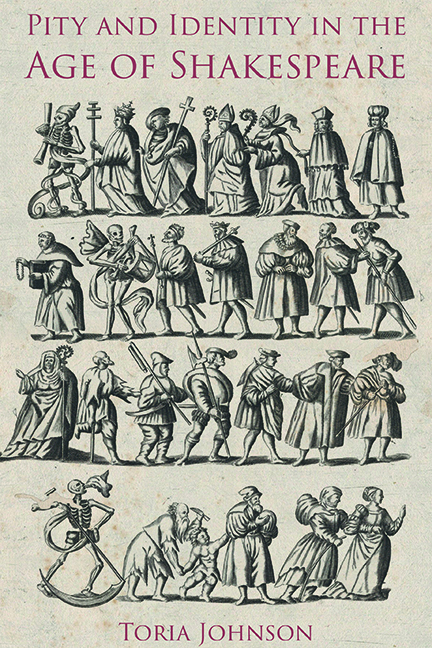Book contents
- Frontmatter
- Dedication
- Contents
- Acknowledgements
- Textual Note
- Introduction
- 1 ‘My name is Pity’: Mediated Emotion and King Lear
- 2 Violent Spectacle and Violent Feeling in Early Modern Lucrece Narratives
- 3 Dramatic Reworkings of Poetic Pity
- 4 Theorising Humanity Through Pity
- Conclusion
- Bibliography
- Index
- Miscellaneous Endmatter
Conclusion
Published online by Cambridge University Press: 07 October 2022
- Frontmatter
- Dedication
- Contents
- Acknowledgements
- Textual Note
- Introduction
- 1 ‘My name is Pity’: Mediated Emotion and King Lear
- 2 Violent Spectacle and Violent Feeling in Early Modern Lucrece Narratives
- 3 Dramatic Reworkings of Poetic Pity
- 4 Theorising Humanity Through Pity
- Conclusion
- Bibliography
- Index
- Miscellaneous Endmatter
Summary
War is waged over the matter of pity. This war probably has no age but, and here is my hypothesis, it is passing through a critical phase. We are passing through that phase and it passes through us.
When Derrida references a war over pity in ‘The Animal That Therefore I Am’, he is partly recognising emotional obligation as a contentious concept, a malleable thing that changes according to the very many follow-up questions that might arise: in what context, for whom, how much, at what cost? For Derrida these considerations are foundational to his larger questions surrounding the ontology of nonhuman animals. The conflict over these issues, he notes, is as much determined by one's understanding of pity's reach as it is about ‘the unequal forces’ (human and non-human) locked in ‘an unequal struggle’. The battle lines are therefore drawn ‘between those who violate not only animal life but even and also this sentiment of compassion and, on the other hand, those who appeal to an irrefutable testimony to this pity’. This moment acknowledges that injustice might be produced as a result of an emotional misfiring, but it also more importantly frames emotion as a concept that itself might be violated. To accept the history of violence against pity is also to extend the reach of what happens in the name of pity, what happens when pity is wilfully rejected: these are moments that reach beyond the immediate to have a broader conceptual resonance. What is also striking to me about Derrida's comments is that they imagine a much larger historical arc to this particular conflict over a specific emotion. This war over pity, he observes, ‘probably has no age’, perhaps has no clear start or finish, and yet still might have moments of crystallisation, eras of particular impact or clarity. These are defining moments not just in the history of pity but also in the history of subjectivity: ‘we are passing through that phase’, he suggests, before adding that ‘it passes through us’.
Derrida's insistence on his own moment as ‘a critical phase’ of the war over pity should remind us that many other eras have made the same claim, and many others have interpreted their own anxieties about pity as being of peculiar significance in the broader history of that emotion.
- Type
- Chapter
- Information
- Pity and Identity in the Age of Shakespeare , pp. 195 - 200Publisher: Boydell & BrewerPrint publication year: 2021

